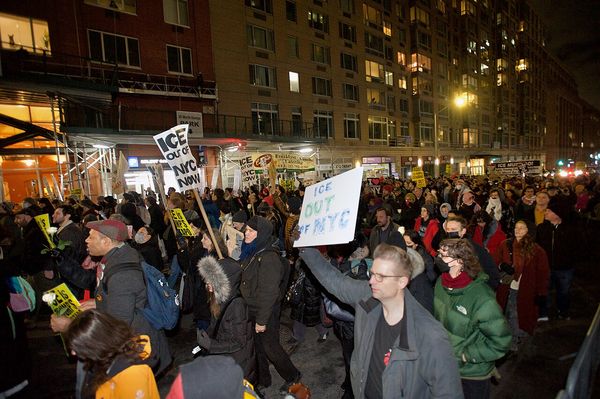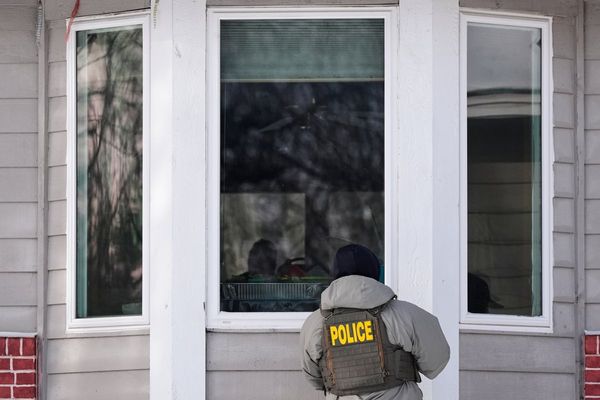BALTIMORE — Something was missing from Adrienne Kilby’s life in Baltimore five years ago. She turned to her therapist and her friends — “who are lovely, but they’re not queer,” she said — to express a desire to meet more people who, like her, identify as part of the LGBTQ+ community.
Specifically, Kilby, a cisgender queer woman, was searching for a hiking group.
“[My therapist] kind of laughed at me, and she was like, ‘Uh, I guess you have to start one,’” Kilby recalled.
That’s how Baltimore Queer Hike was born.
“I was looking for a sense of community,” Kilby, 37, said. “My personal goal was achieved by starting the group, and it’s been really cool to see new people making connections there.”
Kilby had tried meeting other queer people at bars, but it wasn’t really her scene. While bars have historically served as a social hub for the LGBTQ+ community, they’re not the only venue to make connections for LGBTQ+ Baltimoreans, who have forged their own spaces for support on the hiking trails, at the climbing gym and in the coffee shop.
The Stonewall Uprising, which unfolded over multiple days in 1969 when New York City Police raided a gay bar called the Stonewall Inn, is credited with launching the gay rights movement into the mainstream in the United States. The bar offered a taste of freedom for queer patrons in the face of severe laws and in 1999 became the first LGBTQ+ site added to the National Register of Historic Places.
“In the past, that was the only place you could go: a secret queer bar,” Kilby said. “You couldn’t be out in public, in a group.”
In Baltimore, some LGBTQ+ establishments, like Leon’s, a Mount Vernon watering hole that bills itself as the city’s oldest continuously open gay bar, still exist. A number of others have shut their doors over the past decade.
“There are a lot of social groups now for queer people that don’t revolve around bars anymore,” said Kilby, who works as a therapist, and launched Baltimore Queer Hike with an inaugural outing at Gunpowder Falls State Park that attracted a dozen or so participants. Now, demand is so high she caps her monthly hikes at around 25 people.
The Baltimore Queer Hike Facebook page has over 2,000 members who post photos from their own adventures, share travel advice and make plans.
The hikes, which Kilby said are typically around 3 miles, are appropriate for beginners. Participants traverse locales from Herring Run Park to Patapsco Valley State Park, and occasionally trek out as far as the Appalachian Trail and Old Rag Mountain in Shenandoah National Park.
Everyone in the queer community is welcome to attend Kilby’s hikes, she said. That sets the group apart from others that cater to more specific identities, according to Sima Pandya, 54, who identifies as queer and has joined the outings.
“I like to go to all the groups, because I like to meet people of the whole rainbow, and all the letters, but Queer Hike has them all, in one group,” said Pandya, adding that the hikes are more social than strenuous, and she always meets new people.
“Maryland’s been one of my favorite areas for how many different queer groups and events that you can go to,” said Pandya, who previously lived in Michigan, California, Oregon and New York.
A handful of queer bars and clubs, including Leon’s, The Drinkery in Mount Vernon and the Baltimore Eagle are still open in the city. There are also groups like Baltimore-Area LGBTQIA+ Happy Hours, which hosts monthly gatherings, and events like “Dyke Nite,” hosted at The Ottobar in Charles Village. But once-prominent queer Baltimore establishments, including Grand Central, The Hippo and Club Bunns, are now closed.
“There are less intentional queer spaces, but it seems like there are more queer people,” said Tres McMichael, who grew up in Pikesville and now lives and works in D.C. “Because of that, the queer community’s had to be a little more intentional about how we gather.”
In 2019, McMichael, 26, helped found a group called Baltimore Queer Climbers while working at Hampden’s Earth Treks, now Movement, an indoor bouldering gym. Over a dozen people showed up for the group’s first climbing event, he said.
“The community was already there,” said McMichael, who is gay and who believes climbing jives with the experience of being queer.
“When you’re climbing a wall, and there’s a really difficult [challenge], you’re not necessarily going to be able to do that all the time by yourself, so you might need another climber,” he said. “And that’s the same way I think about climbing through life as a queer person — you don’t do it in isolation, you do it in community.”
Nina Sions, who helped to create Baltimore Queer Climbers and uses they/them pronouns, said the group gave them a sense of belonging.
“I didn’t always have the best relationship with the queer community,” said Sions, 32, who came out as a lesbian at 14 and also identifies as nonbinary. “When I was really young, I found it kind of clique-y. It just wasn’t necessarily the place that felt like home for me.”
Incorporating games and opportunities for climbers to introduce themselves to one another stoked meaningful interaction, said Sions, who now lives in West Virginia.
“Just coming together is not enough,” they said. “If you don’t create these cues toward vulnerability, then nobody’s gonna be vulnerable.”
Today, monthly Baltimore Queer Climbers events at Movement in Hampden and Timonium attract as many as roughly 40 participants.
“We certainly … want other queer, gender-expansive folks to come and use the opportunity to connect with people who look like them, think like them, have relationships like them,” said Pauley Dempsey, who works at Movement Hampden and helps organize the climbers.
The group has been accepting and supportive of “every single version of me,” said Dempsey, 28, who is queer and transgender.
“To be able to get yourself in a vulnerable place with people that you’re trying to build community with, I think only deepens the community,” Dempsey explained. “You’re going there and you’re being present with those that are around you and with yourself, on a wall, doing this fear-inducing activity.”
Dempsey, who has been sober for about a year, said bars don’t typically foster the same kind of openness.
Red Emma’s, a worker-owned coffee shop and events space just west of Better Waverly, has its own bar — alongside an adjoining bookstore with robust sections on queer studies, trans studies, feminism and women’s studies.
“Bars are the easy answer,” said Andi Scotti, who works at Red Emma’s and identifies as genderqueer. “What about the [person] that just found out that they’re gay, but maybe doesn’t drink? Where do they go to meet other gay people and learn about what it means to be a queer person?”
Though the business isn’t explicitly an LGBTQ+ establishment, it’s helmed by a number of queer owners and attracts LGBTQ+ clientele.
It was at Red Emma’s that Scotti, 34, who uses they/them pronouns, became more in tune with their own identity, including learning “the vocabulary to express it,” they said.
During the coronavirus pandemic, Scotti said they cut down on drinking and going out. At gathering spots like Red Emma’s, imbibing isn’t a prerequisite for a sense of LGBTQ+ connection.
“This place is really about community,” they said. “When people talk and share ideas with each other, they learn new things about each other and they learn new things about themselves.”







